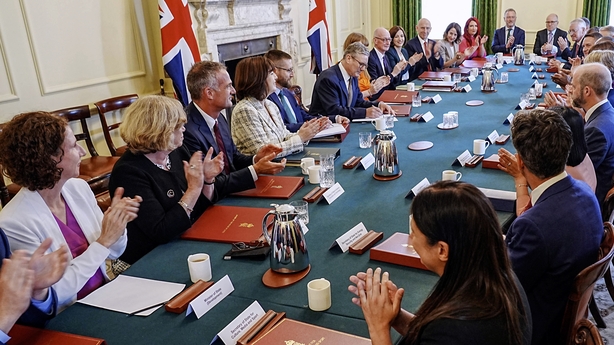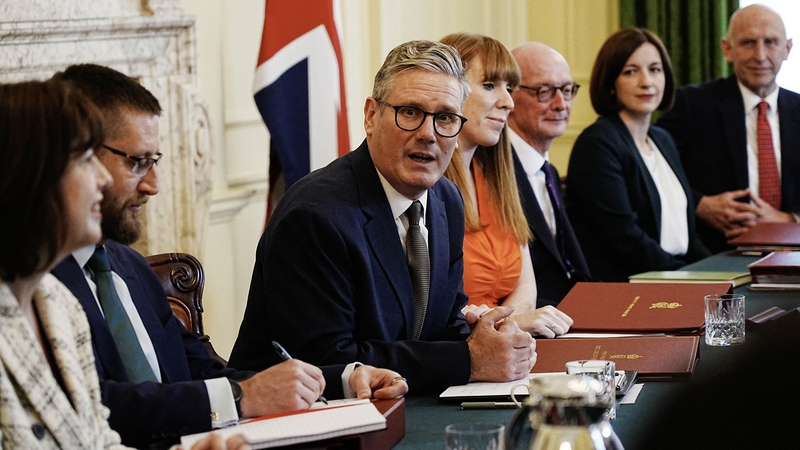British Prime Minister Keir Starmer has told his ministers that there was a "huge amount of work to do" as he chaired the first meeting of his new cabinet on his first full day in Downing Street.
The Prime Minister told his team it had been "the honour and the privilege of my life" to be invited by Britain's King Charles III to form the government after sweeping to an historic victory at the polls.
In brief remarks at the top of the meeting, he told ministers: "We have a huge amount of work to do, so now we get on with our work."
Speaking at a press conference in Downing Street this afternoon, Mr Starmer confirmed his previously declared intention to end the outgoing Conservative government's flagship scheme to deport migrants to Rwanda.
"The Rwanda scheme was dead and buried before it started... I'm not prepared to continue with gimmicks that don't act as a deterrent," he told reporters following the cabinet meeting.
Yesterday, the Labour leader made a raft of appointments on his first day at Number 10 and spoke with international leaders, including US President Joe Biden.
In a call with Taoiseach Simon Harris, both leaders agreed to have a "close and constructive working relationship".
Mr Harris accepted an invitation to meet the new British Prime Minister in person in Downing Street on 17 July.
The Prime Minister confirmed Rachel Reeves as Britain's first woman chancellor, Yvette Cooper as Home Secretary and David Lammy as Foreign Secretary.
We need your consent to load this rte-player contentWe use rte-player to manage extra content that can set cookies on your device and collect data about your activity. Please review their details and accept them to load the content.Manage Preferences
Angela Rayner officially became his Deputy Prime Minister and retained the levelling up, housing and communities brief.
John Healey was named Defence Secretary; Shabana Mahmood Justice Secretary; Wes Streeting Health Secretary; Bridget Phillipson Education Secretary; and Ed Miliband Energy Secretary.
Mr Starmer and ministers looked in high spirits as the Prime Minister said: "Colleagues, it is absolutely fantastic to welcome you to the Cabinet, our first meeting, and it was the honour and the privilege of my life to be invited by His Majesty the King yesterday to form the Government, and to form the Labour Government of 2024.
"And now we hold our first Cabinet meeting, so I welcome you to it."

Read more:
Starmer set for short-lived honeymoon as he takes office
Latest UK Election stories
In his first speech on Downing Street yesterday, Mr Starmer said the British people had voted "decisively for change".
He said the country could "move forward together" as Labour took office following 14 years of Conservative rule.
Pat McFadden, who played a central role in shaping Labour's election campaign and was named Chancellor of the Duchy of Lancaster, said the new Cabinet would meet today.
He told BBC Radio 4 that Mr Starmer would have to quickly allocate responsibilities and "give his new Cabinet their marching orders and then there's big international events coming.
"We have a Nato summit next week. That will be his first moment on the international stage. And while he's doing that, he will want his new Cabinet to get on with it pretty quickly."
He said high on Mr Starmer's agenda will be the six first steps Labour has set out: delivering economic stability, cutting NHS waiting times, launching a new border security command, setting up Great British Energy, cracking down on anti-social behaviour, and recruiting 6,500 new teachers.
Just days after his appointment, Mr Starmer will be propelled onto the international stage, jetting to Washington DC for the Nato leaders' summit, where discussions will include support for Ukraine.
He is also due to host the European Political Community summit in the UK on 18 July.
The Prime Minister has already spoken to US President Joe Biden and discussed their commitment to the special relationship between the UK and US, protecting the gains of the Good Friday Agreement and support for Ukraine.
Mr Starmer also spoke to Ukrainian President Volodymyr Zelensky and reassured him of the "unwavering commitment" and said the UK would continue supplying defensive support.
He also had calls with the President of the European Commission, Ursula von der Leyen, Italian Premier Giorgia Meloni, Polish Prime Minister Donald Tusk, Canadian Prime Minister Justin Trudeau and Scottish First Minister John Swinney.
